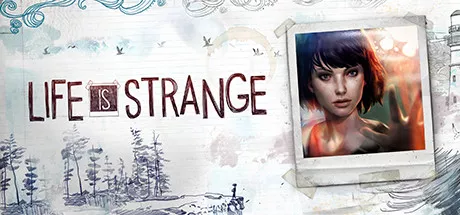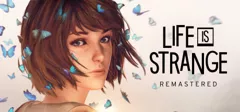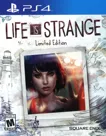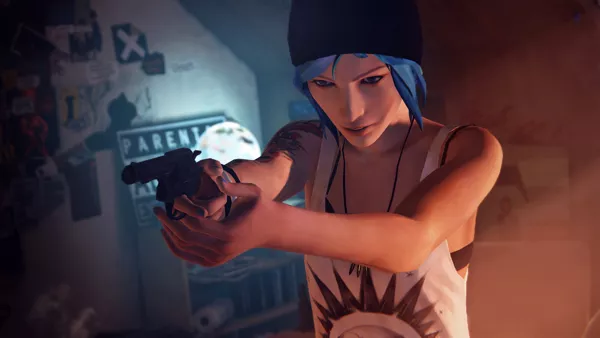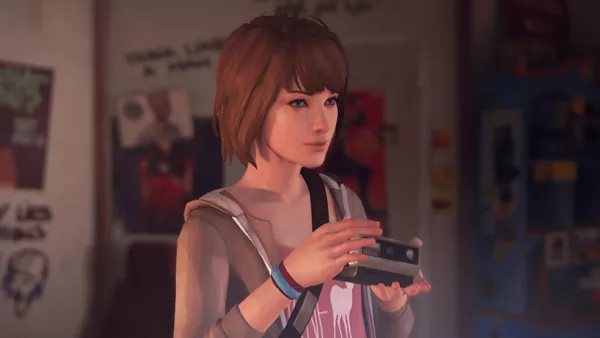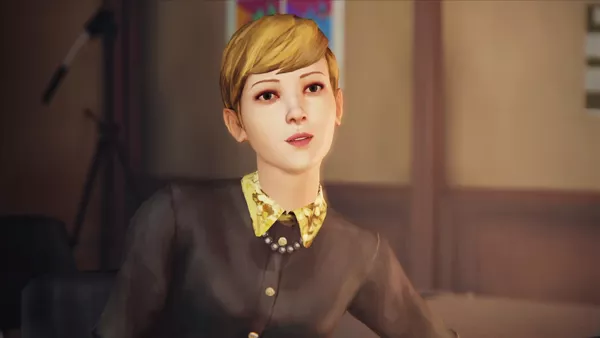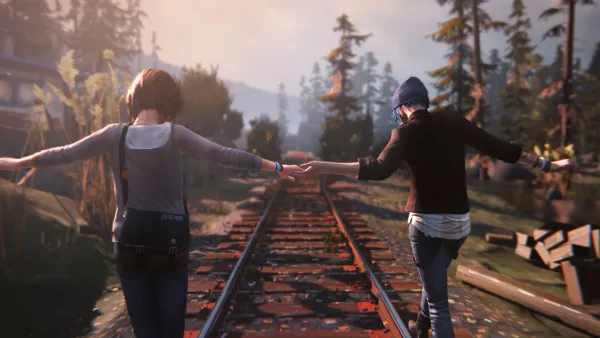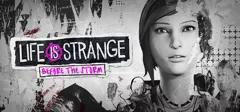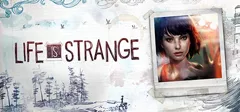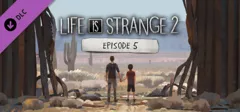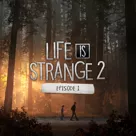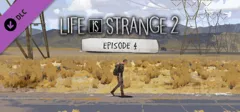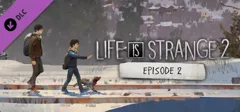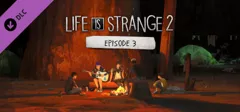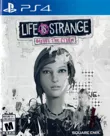Life Is Strange: Complete Season - Episodes 1-5
Description
Life Is Strange is an episodic graphic adventure series. The player controls Max (Maxine Caulfield), who returns to her hometown Arcadia Bay after being away for five years. Upon returning back, she learns that the father of her best friend Chloe Price died in the year she left. Chloe then became friends with Rachel Amber who helped her with grieving.
Unfortunately, Rachel disappeared in those five years in a mysterious way. Max and Chloe decide to investigate her disappearance. The player has the option to rewind time and redo any choice, given that no checkpoint was made in between. All choices made by the player have an effect on the ending of the game. Rewinding time does have its charms, but Max quickly learns playing with time can have disastrous consequences.
The individual episodes were released between January and October 2015:
- Life Is Strange: Episode 1 - Chrysalis
- Life Is Strange: Episode 2 - Out of Time
- Life Is Strange: Episode 3 - Chaos Theory
- Life Is Strange: Episode 4 - Dark Room
- Life Is Strange: Episode 5 - Polarized
On PC, PS3, PS4 and Xbox One the first episode was released separately with the option to buy a season pass for the remaining four, or players could buy the entire season at once. For Xbox 360 the first episode was also released separately with a season pass for the remaining four, but without the option to buy the entire season as a single purchase, which is why the platform is not covered by this full season game entry. For the console versions each episode can be bought as DLC for the first one. For Windows episode two to five is not available separately, but only as a single purchase.
Spellings
- ライフ イズ ストレンジ - Japanese spelling
Groups +
Promos
Reviews
Critics
Average score: 85% (based on 9 ratings)
Players
Average score: 4.2 out of 5 (based on 81 ratings with 2 reviews)
Time Travel, Mysteries, and Teen Angst
The Good
We’ve all had those moments where we wonder what could have happened if we had said or done something differently. Maybe we’ve wanted to re-do a test after realizing we had put down the wrong answer. Maybe, if we had said something else during a conversation, it would have steered us in an entirely different direction. The smallest decisions and actions end up snowballing into huge shifts in our lives.
Life is Strange is an intriguing game from French developer Dontnod Entertainment that explores choice and consequence and the butterfly effect. It works as a surreal mystery tale and a mature coming-of-age story, that’s about learning to live with the hard choices we make. It also tackles more contemporary themes including bullying, surveillance, class divide, and urban decay.
Life is Strange details the adventures of a young girl named Max Caulfield. Max is a budding photographer attending a prestigious art school in the city that she had moved away from five years ago. One day, Max sees a boy shooting a strange girl in the school bathroom. This traumatic event awakens something in Max, gifting her with the power to rewind time, allowing her to alter decisions made in the past. After using her power to stop the shooting, Max learns that the girl she saved was none other than her old friend Chloe, whom she hasn’t seen for years. Over the course of the week, the two friends get involved in investigating the mysterious disappearance of Chloe’s replacement friend, Rachel Amber, who hasn’t been seen in six months.
Life is Strange is an adventure game, though it is narratively focused, rather than puzzle-focused. There are puzzles, but they are mostly pretty basic and generally involve Max utilizing her time-manipulation powers to answer questions or manipulate the environment. There are even a couple of stealth sections, something which is downright unorthodox for this type of game. That said, the puzzles mostly do a good job of feeling like an organic part of the narrative, rather than an arbitrary obstacle as in other adventure games. I say mostly, as there are several annoying “find these objects” sections where you’ll need to search a scene for various objects, which unfortunately slow down the pace of the game.
The main mechanic is making choices which have both small and large impacts on the story. Choices are designated as major and minor. Major choices are the most important, but the game makes sure that you can see the impacts of your minor decisions as well, even if they ultimately end up being a text message or an additional line of dialog. Some of the major choices aren’t always binary A/B choices - rather they are scenarios that can play out in several different ways. Take for instance a scene early in the game where Chloe is smoking weed while Max hides in the closet while Chloe’s father enters the room. Max can stay in the closet, or she can come out and either take the blame for the joint for herself. She can even pass the blame to Chloe (it is her joint, so she will be quite angry if you do this). There were even a few times where I thought that something was scripted only to find out after the fact that the outcome could have been different. This forces you to pay attention to every decision that you make, because you never can be sure exactly what kinds of consequences it will have.
Most decisions can be re-wound to see their immediate effects, though there are a few key moments where the game takes away your power or forces you to stick with a decision. Once you leave a scene where a decision is made, it becomes permanent, and you cannot go back and alter it if you end up hating the consequences, due to the limitations of Max’s power.
Technically, the game runs off of Unreal Engine 3, which is a rather odd choice for an adventure game, as the engine is typically used for either first-person shooters or action games. As a result, the game has more of a typical third-person controls setup, with one stick moving Max and the other freely moving the camera around. There are no fixed angles while controlling Max, unlike in other 3D adventure games. As a result, the world feels highly detailed and realistic. Textures are hand-painted and photography style filters are applied to give the game a environments a Polaroid look, which is fitting since Max is always carrying one around with her.
The voice acting is very good, and I don’t think there were any noticeably bad performances in the game. The soundtrack, by indie musician Syd Matters, is influenced by folk and indie rock, and the game includes licensed music from various bands and artists that you’ve probably never heard of, but that Max obviously loves.
It’s really hard to review a game like this, as its appeal comes primarily from what can’t be spoiled, which is the story. What I will say is that the writing is generally pretty enjoyable, though it is at times easy to raise an eyebrow at the obscure pop-cultural references and overuse of teen slang. There are some amazing twists and characters to be found throughout the story, and the game always makes sure to leave you on-edge for the next episode. The storyline is also quite a bit darker than the games soft-toned appearance and folky soundtrack let on. <br><br>**The Bad**<br>The graphics range from not bad to appealing, but the same cannot be said of the character models, which are stiff and at times occasionally ugly. The lip-syncing is laughably bad, arguably some of the worst I’ve ever seen. The lip-sync does improve somewhat starting at Episode 4, but it’s not enough to make up for the problems beforehand. In addition, there was some screen tearing on the PS3 version, as well as shadow pop-in, though this is sadly typical of many Unreal-based games on the system.
The ending is moving and emotionally powerful, though you’ll easily see it coming if you’re familiar with a lot of time-travel stories. Even when the game gives you a different choice, the other ending is a cheap, short animation, while the former ending features highly developed cutscenes and voice acting. It’s obvious which one the developers prefer for the player. This kind of preferential choice goes against the idea that there IS no “right way” to play the game.
In addition, the choices up to the last episode are effectively rendered meaningless by the game’s conclusion - only the final choice gives you a different ending, everything else that you did up to that point has an almost negligible impact. it is you, the player, who provides the meaning and context for the choices. While this has been a failing of other choice-based adventure games, Dontnod instead made the proverbial “illusion of choice” a core part of the game’s themes, so the ending still somewhat works. Having said that, I would have been even more impressed if Dontnod had actually solved the problem, instead of merely sidestepping around it. The clear action-and-reaction of the rest of the game seemed to suggest that Life is Strange was fully capable of delivering on its ambitions, only to have them constrained by the narrative Dontnod wanted to tell. It essentially means that the game is really only good for a one-time play through.
The Bottom Line
I’ll say this much, however: If you’re looking to get away from the robots, aliens, dragons, mutants and macho soliders found in many of today's games, then you owe it to yourself to play Life is Strange. It’s a clever and emotional exploration of settings and themes that aren’t usually seen in games.
As with their previous game, Remember Me, Dontnod has crafted one of the most believable and “real” feeling game worlds that I have seen in quite some time, and this time they managed to do it within an almost mundane setting. That, combined with the innovative time travel mechanics and engaging characters, was enough to mark Life is Strange as a satisfying effort. Dontnod has said that they wanted to make a game that felt like an indie film, in contrast to the blockbuster feel of just about everything else. Despite its faults, Life is Strange, strangely succeeds at doing just that.
PlayStation 3 · by krisko6 (814) · 2015
Life is Strange, but oh so beautiful...
The Good
How do you review a game like Life is Strange? You have to approach it differently than other types of games. I have to do some form of literary criticism, because of it's strong narrative content. Life is Strange has to be approached differently from adventure gaming classics like Monkey Island and maybe even Gabriel Knight.
But it is an adventure game. Adventure games were my first love, because they told stories. But they stopped evolving in the late 90's and other game genres started to tell better stories than adventure games ever did. Go tell an adventure game fan from 1994, that one day his detested fps games will have better stories and more nuanced characters than any adventure game he has played ever had. He'll probably try to kill you for blasphemy.
But that's the sad truth. Adventure games were boring and uninspired for a long time, forgotten by the industry and the players. Sure there were some hailed classics, like Syberia, but honestly, it was a rather desperate and pathetic attempt to justify the genre's continued existence to it's own fans that nobody outside the genre really cared for.
That was until 2012, when Telltale released Walking Dead: Season 1. Suddenly an adventure game was a mainstream hit. People were talking about it, like it was cool to play them again. They had status and pop culture influence now.
And Life is Strange exists because of Walking Dead. It's a Telltale type of game. But it has learned some of the lessons that Telltale itself yet has not. For years people have debated over the question - Are Telltale games really games? I don't know. But Life is Strange definitely is.
Made by a small french studio, Life is Strange is an experimental game – both by it's narrative and gaming content. It's a piece of interactive fiction, that explores the possibilities that being a game can give it to enhance it's storytelling potential and effect. Now that was a fancy sentence. But I intend to prove it's truthfulness.
In LIS the player can rewind time, thus giving the player unique types of puzzles and situations. Even choices can be rewinded, important story moments, yours to be manipulated until you're certain that you can live with what just happened.
This gameplay is so naturally tied to it's story, that both the game and the story form a one holistic whole. It needs to be this kind of game, to tell this kind of story.
So I can gladly testify that playing LIS was fun. It is a game and it had good, intuitive gameplay. But anyone who plays LIS, won't give a shit about it's gameplay, because where this game leaves it's mark is in it's writing.
I have to separate between story and characterisation, because when I say that LIS had a great story, you might think that I mean the plot. A happened, then B happened.... like with many games that are known for their stories, it's actually their plot and events that are thought of when their stories are praised. Now LIS does have memorable events, and an intriguing plot, but I cannot just say that it had a good story and be done with it.
Because Life is Strange is actually a serious and thoughtful character study. Life is Strange is unique, because it's a good young adult fiction in the form of a game. A script by french writers – Jean-Luc Gano and Christian Divine – telling a story about american teenagers, that is also universal and insightful about the human condition.
Wait... now I made it sound so serious, while in reality, it is very playful with it's genres and influences. But I just want to convey that the essence of it's brilliance lies in it's characterisation.
Max and Chloe.
Two well-written, complex, nuanced, well-acted characters that feel remarkably real. This is what I wanted to get to – Max and Chloe.
Life is Strange captures the way friendships felt like when you were young. When you could look at another person and think that she's the best thing ever. Completely awestruck by her. Admiring her. Mixture of all kinds of elevating feelings. That wonderful naivety and innocence, but also selfishness. When you don't see said person's faults, or how dangerous she actually is. When you don't see your own faults. Life is Strange captures all that.
You will spend the entire game inside Max's head, you'll hear her thoughts, interpret events through her eyes and understanding. So you'll become very close to the way Max thinks. But Max also sometimes misunderstands situations. And the game does have it's fun with that. While you can rewind any choice, you're never quite sure. Maybe Max misunderstood the situation, maybe she didn't. But even when exhausting all the choices with the rewind option, the tension remains. You're not quite sure what will happen next.
And when you finally understand all the characters in the game, you just have to take a cigarette and say: “that was beautiful.... man, he was just human.” Everyone is just human.
There's a moment in game when a character commits suicide (but it can go both ways, depending on your choices). Everyone is filming it with their smartphones. Now they might feel sorry, guilty or even righteously angry at the bullies who drove that person to suicide... but it doesn't change the fact, that in that moment, everyone filmed the event with their smartphones, getting some kicks out of it. So human.
They all might have some great sorrows in their life, but it doesn't make them good people. Doesn't even make them bad people. Just people.
When you read a book, you can as a reader see both the big picture and the character's view of things. You can understand all the motivations, and sometimes that feeling that comes... that feeling of understanding. Interactivity enhances the effect.
Quite honestly, interactivity also has some dangerous potential of tricking you psychologically. There were moments in the game, when it started to feel like I'm interacting with real people.
Imagine this, you just experienced a very tense moment in a game, and now there's a quiet scene. You can put on some music. Great songs. All of them. You pick one. Chloe is smoking a cigarette in the bed. You make Max talk with her. A conversation follows, where Max gets to know Chloe better (or feels like she got to know her better). They both open up to each other. And she laughs. Max feels connected. You feel connected.
What we might witness in the future? Maybe actual virtual reality friendship simulators. But I digress.
I also have to mention the acting in this game, especially the main characters - Hannah Telle as Max and Ashly Burch as Chloe. We don't yet give awards for best acting in a game, but maybe we should.
Ashly Burch really feels like she's Chloe, and when she says that line "What kind of world does this?!" in that scene, (you'll know it, when you see it) the way her voice subtly breaks under emotion... that entire scene, a performance worthy of applause. I can still hear it in my mind.
And I should not forget the music. I already described a scene involving a choice of music. There are some great songs by unknown indie bands. The composer for the game himself is a lead in one of these bands – Syd Matters (or actually Jonathan Morali, also french). The game opens with his song: "To all of you american girls, it's sad to imagine a world without you..." And Max just walks through the corridors. It's a soul-touching moment, it surely is.
His wonderfully melancholic and contemplative touch is felt throughout the game, beautifully capturing the joy and sadness that is youthful love and Pacific Northwest. It's a collaboration of artists, what this game is. They created something truly beautiful here. France, you did good.
The Bad
Of course there are some bad things. You can feel sometimes that the game lacked budget, after all, it wasn't expected to be a success.
Not all voice acting is good, some minor characters sound very flat and acted, not natural like Chloe and Max.
And there was one very bad puzzle from episode 2, where you had to find 5 bottles. It was so bad that the game even makes a joke about how well the players “liked” it. It's an example of a very bad attempt to artificially lengthen the playtime. There are some other minor moments like this too.
And sometimes the game doesn't always hint very well what you're supposed to do. There's a sneaking moment in episode 4, where I thought I had to sneak past a character, but in fact I had to rewind time to the moment before that character came out of the door and in that second, quickly move past him. Took me some 20 minutes to figure that out.
Some players have argued, that they felt that there was originally a bigger mystery than what the game actually revealed in the end. Maybe. Could just have been red herrings. I was hooked in the story to the end, so I didn't feel let down. I also played the episodes on a binge-run, not waiting several months in-between, so that also affects my experience.
But. Not all endings are satisfying. I give you that much. One ending definitely feels more canon than the other.
The Bottom Line
I remember when I read the Hobbit for the first time. I felt sad after finishing the book. It was a fun book, great characters, I was thrilled to experience their adventure... but then it was over and it felt sad. That great sad. Like you experienced something great, but now it's over. A glimpse of true joy, that unfortunately can't last. I felt that particular form of sad after I finished Life is Strange.
Max and Chloe's extraordinary tale is over, and now the survivors have to go back to ordinary mundane life. But they're never quite the same.
And neither is the player.
Windows · by The Fabulous King (1332) · 2017
Trivia
Awards
- EGM
- 2015 - ranked 5 (Top 25 of 2015)
Analytics
Upgrade to MobyPro to view research rankings!
Related Sites +
-
TrueAchievements achievement guide
The TrueAchievements achievement guide for Life Is Strange -
Wikipedia: Life is Strange
Article about the game in the open encyclopedia
Identifiers +
Contribute
Are you familiar with this game? Help document and preserve this entry in video game history! If your contribution is approved, you will earn points and be credited as a contributor.
Contributors to this Entry
Game added by Kennyannydenny.
Macintosh added by Charly2.0. Linux added by qptain Nemo. Gloud added by firefang9212.
Additional contributors: MAT, Alaka, Evolyzer.
Game added February 5, 2015. Last modified February 19, 2024.
